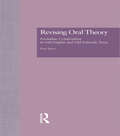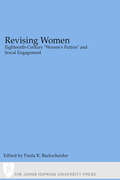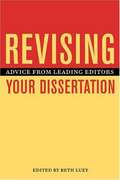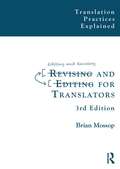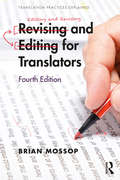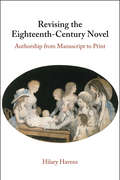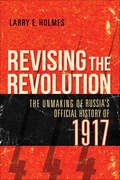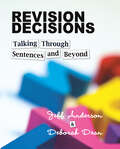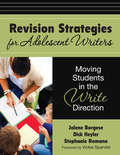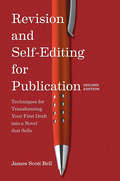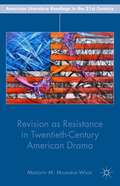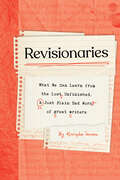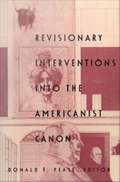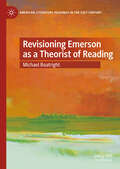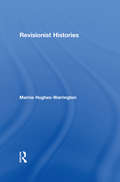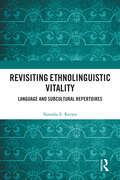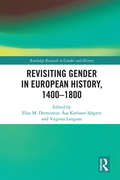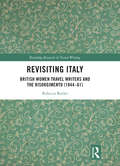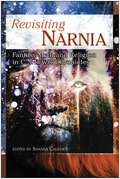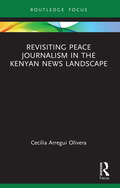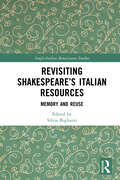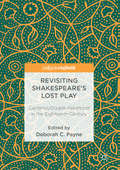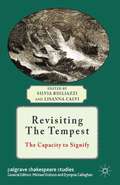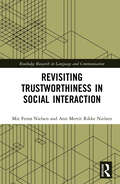- Table View
- List View
Revising Oral Theory: Formulaic Composition in Old English and Old Icelandic Verse (Garland Studies in Medieval Literature #Vol. 16)
by Paul AckerFirst published in 1998. Routledge is an imprint of Taylor & Francis, an informa company.
Revising Women: Eighteenth-Century "Women's Fiction" and Social Engagement
by Paula R. BackscheiderRevising Women is a collection of essays by a distinguished group of feminist critics. Each essay is a contribution to the history of the English novel, to our understanding of literature's place in cultural debate, and to women's studies. The essays give steady attention to the ways novels participate in social processes and the ways women perceived the public sphere and stubbornly attempted to participate in it. Rich contextualization and adept use of theory reveal both the individual writer's story and the story beneath the text that is a cultural production with the potential to reveal why we and our society are as we are. Each essay develops ways of using history in relation to literature, takes up large historical events and issues, and interprets in fine detail what individuals do with them. Beginning with the fictions of the late seventeenth century, and ending with Maria Edgeworth and Jane Austen, the essays in Revising Women are characterized by informed historicizing, detailed textual explication, sophisticated feminist theory, and dedicated attention to the interrelationships between life and literary works and between everyday existence and political processes.
Revising Your Dissertation: Advice from Leading Editors
by Beth LueyThis lively guide offers practical advice on turning a Ph.D. dissertation into a book or into journal articles that will appeal to publishers and readers.
Revising and Editing for Translators: Revising And Editing For Translators (Translation Practices Explained)
by Brian MossopRevising and Editing for Translators provides guidance and learning materials for translation students learning to edit texts written by others, and professional translators wishing to improve their self-revision ability or learning to revise the work of others. Editing is understood as making corrections and improvements to texts, with particular attention to tailoring them to the given readership. Revising is this same task applied to draft translations. The linguistic work of editors and revisers is related to the professional situations in which they work. Mossop offers in-depth coverage of a wide range of topics, including copyediting, style editing, structural editing, checking for consistency, revising procedures and principles, and translation quality assessment. This third edition provides extended coverage of computer aids for revisers, and of the different degrees of revision suited to different texts. The inclusion of suggested activities and exercises, numerous real-world examples, a proposed grading scheme for editing assignments, and a reference glossary make this an indispensable coursebook for professional translation programmes.
Revising and Editing for Translators: Revising And Editing For Translators (Translation Practices Explained)
by Brian MossopRevising and Editing for Translators provides guidance and learning materials for translation students and professional translators learning to revise the work of others or edit original writing, and those wishing to improve their self-revision ability. Revising and editing are seen as reading skills aimed at spotting problematic passages. Changes are then made to meet some standard of quality that varies with the text and to tailor the text to its readership. Mossop offers in-depth coverage of a wide range of topics, including copyediting, stylistic editing, checking for consistency, revising procedures and principles, and translation quality assessment—all related to the professional situations in which revisers and editors work. This revised fourth edition provides new chapters on revising machine outputs and news trans-editing, a new section on reviser competencies, and a completely new grading scheme for assignments. The inclusion of suggested activities and exercises, numerous real-world examples, and a reference glossary make this an indispensable coursebook for professional translation programmes.
Revising the Eighteenth-Century Novel: Authorship from Manuscript to Print
by Hilary HavensRevisions form a natural part of the writing process, but is the concept of revision actually an intrinsic part of the formation of the novel genre? Through the recovery and analysis of material from novel manuscripts and post-publication revisions, Hilary Havens identifies a form of 'networked authorship'. By tracing authors' revisions to their novels, the influence of familial and literary circles, reviewers, and authors' own previous writings can be discerned. Havens focuses on the work of Samuel Richardson, Frances Burney, Jane Austen, and Maria Edgeworth to challenge the individualistic view of authorship that arose during the Romantic period, and argues that networked authorship shaped the composition of eighteenth-century novels. Exploring these themes of collaboration and social networks, as well as engaging with the burgeoning trend towards textual recovery, this work is an important contribution in the study of eighteenth-century novels and their manuscript counterparts.
Revising the Revolution: The Unmaking of Russia's Official History of 1917
by Larry E. HolmesThe clash between scholarship and politics—between truth and propaganda—was ruthless for historians in Istpart, the Russian Communist Central Committee's official historical department.Istpart was tasked with preserving the documentary record, compiling memoirs, and upholding ideological conformism within the national narrative of the 1917 revolution. In Revising the Revolution, Larry E. Holmes examines the role of Istpart's historians, in both the Moscow office and a regional branch in Viatka, who initially believed they could adhere to the traditional standards of research and simultaneously provide a history useful to the party. However, they quickly realized that the party rejected any version of history that suggested nonideological or nonpolitical sources of truth. By 1928, Istpart had largely abandoned its mission to promote scholarly work on the 1917 revolution and instead advanced the party's master narrative. Revising the Revolution explores the battle for the Russian national narrative and the ways in which history can be used to centralize power.
Revision Decisions: Talking Through Sentences and Beyond
by Jeff Anderson Deborah DeanRevision is often a confusing and difficult process for students, but it's also the most important part of the writing process. If students leave our classrooms not knowing how to move a piece of writing forward, we've failed them. Revision Decisions: Talking Through Sentences and Beyond will help teachers develop the skills students need in an ever-evolving writing, language, and reading world. Jeff Anderson and Deborah Dean have written a book that engages writers in the tinkering, playing, and thinking that are essential to clarify and elevate writing. Focusing on sentences, the authors use mentor texts to show the myriad possibilities that exist for revision. Essential to their process is the concept of classroom talk. Readers will be shown how revision lessons can be discussed in a generative way, and how each student can benefit from talking through the revision process as a group. Revision Decisions focuses on developing both the writing and the writer. The easy-to-follow lessons make clear and accessible the rigorous thinking and the challenging process of making writing work. Narratives, setup lessons, templates, and details about how to move students toward independence round out this essential book. Additionally, the authors weave the language, reading, and writing goals of the Common Core and other standards into an integrated and connected practice. The noted language arts teacher James Britton once said that good writing floats on a sea of talk. Revision Decisions supports those genuine conversations we naturally have as readers and writers, leading the way to the essential goal of making meaning.
Revision Strategies for Adolescent Writers: Moving Students in the Write Direction
by Jolene A. Borgese Richard E. Heyler Stephanie A. RomanoSupported by the Common Core State Standards, the 30+ strategies in this book include pre-writing planning, peer conferencing, modeling effective revision, and using technology.
Revision and Self Editing for Publication: Techniques for Transforming Your First Draft into a Novel that Sells
by James Scott BellTake your first draft from so-so to sold! You've finished the first draft of your novel--congratulations! Time to have a drink, sit back...and start revising. But the revision process doesn't have to be intimidating. Revision and Self-Editing for Publication, Second Edition gives you the tools and advice you need to transform your first draft into a finished manuscript that agents and editors will fight for. Inside you'll find: Self-editing techniques for plot, structure, character, theme, voice, and more that can be applied as you're writing to reduce your revision workload. Methods for fine-tuning your first draft into a tight, well-developed piece of literature. The Ultimate Revision Checklist, which seamlessly guides you through the revision process, step by step. New Chapter! Exercises and techniques for "deepening" your work to engage and excite readers like never before. Whether you're writing a novel currently or have finished the first draft, Revision and Self-Editing for Publication, Second Edition will give you the guidance you need to revise your manuscript into a novel ready to be sold.
Revision as Resistance in Twentieth-Century American Drama
by Meredith M. Malburne-WadeAmerican dramas consciously rewrite the past as a means of determined criticism and intentional resistance. While modern criticism often sees the act of revision as derivative, Malburne-Wade uses Victor Turner's concept of the social drama and the concept of the liminal to argue for a more complicated view of revision.
Revisionaries: What We Can Learn from the Lost, Unfinished, and Just Plain Bad Work of Great Writers
by Kristopher JansmaFind creative inspiration in this fascinating rummage through the wastebaskets, secret diaries, and abandoned files of 20 literary superstars.If you like to write—whether it&’s a pastime, a passion, or a profession—you&’ve probably found yourself reading something brilliant and thinking, &“I could never do this! I might as well give up.&” But if there&’s one thing every great author has in common, it&’s this: they&’ve all written some hot garbage. In Revisionaries, a writing expert takes you on an engrossing tour through the discarded drafts, false starts, and abandoned projects of influential writers. In the process, he dismantles some of our most deeply held—and most suffocating—ideas about what it takes to produce great creative work. You&’ll learn that: Franz Kafka lacked confidenceOctavia Butler had writer's block F. Scott Fitzgerald wrote bad draftsRalph Ellison got overwhelmedLouisa May Alcott got off to a bad startAnd more deep, dark secrets about the authors you most admireWritten by an award-winning novelist and creative-writing professor, Revisionaries is a compelling peek behind the scenes of genius for writers and readers alike.
Revisionary Interventions into the Americanist Canon
by Donald E. PeaseThroughout the era of the Cold War a consensus reigned as to what constituted the great works of American literature. Yet as scholars have increasingly shown, and as this volume unmistakably demonstrates, that consensus was built upon the repression of the voices and historical contexts of subordinated social groups as well as literary works themselves, works both outside and within the traditional canon. This book is an effort to recover those lost voices. Engaging New Historicist, neo-Marxist, poststructuralist, and other literary practices, this volume marks important shifts in the organizing principles and self-understanding of the field of American Studies. Originally published as a special issue of boundary 2, the essays gathered here discuss writers as diverse as Kate Chopin, Frederick Douglass, Emerson, Melville, W. D. Howells, Henry James, W. E. B. DuBois, and Mark Twain, plus the historical figure John Brown. Two major sections devoted to the theory of romance and to cultural-historical analyses emphasize the political perspective of "New Americanist" literary and cultural study. Contributors. William E. Cain, Wai-chee Dimock, Howard Horwitz, Gregory S. Jay, Steven Mailloux, John McWilliams, Susan Mizruchi, Donald E. Pease, Ivy Schweitzer, Priscilla Wald, Michael Warner, Robert Weimann
Revisioning Emerson as a Theorist of Reading (American Literature Readings in the 21st Century)
by Michael BoatrightPushing beyond the anthologized writings of Ralph Waldo Emerson frequently taught in American literature courses, this book examines the corpus of his published work to cultivate a unique understanding of his ideas in relation to reading. By following the history of Emersonian criticism over the years, including research surrounding Emerson and reading theory, these chapters provide a persuasive and accessible exploration of Emerson that highlight the value of his work for both literary and reading scholars. Boatright argues that while Emerson predates the research in reading studies that emerged in the early twentieth century, his ideas around reading engagement, shared reading experiences, and experimentation with reading are exceedingly relevant for encouraging healthy reading practices in the literature classroom.
Revisionist Histories
by Marnie Hughes-WarringtonRevision and revisionism are generally seen as standard parts of historical practice, yet they are underexplored within the growing literature on historiography. In this accessibly written volume, Marnie Hughes-Warrington discusses this paucity of work on revision in history theory and raises ethical questions about linear models and spatial metaphors that have been used to explain it. Revisionist Histories emphasises the role of the authors and audiences of histories alike as the writers and rewriters of history. Through study of digital environments, graphic novels and reader annotated texts, this book shows that the ‘sides’ of history cannot be disentangled from one another, and that they are subject to flux and even destruction over time. Incorporating diverse and controversial case studies, including the French Revolution, Holocaust Denial and European settlers’ contact with Native Americans and Indigenous Australians, Revisionist Histories offers both a detailed account of the development of revisionism and a new, more spatial vision of historiography. An essential text for students of historiography.
Revisiting Ethnolinguistic Vitality: Language and Subcultural Repertoires
by Natasha E. RavyseThis book examines traditional theories of linguistic vitality in the context of subcultural languages. It argues that traditional methods of investigating linguistic vitality are, according to existing literature, not as reliable as they appear and therefore limited in their testability. The author looks at themes such as the relationships between language and culture, ethnicity within the scope of sociolinguistics, and the notion of ideolinguistic vitality where traditional views intersect with more contextually current ones. She also highlights the importance of studying the nature and principles of subcultural languages which help better inform our understanding of the superdiverse linguistic world. The volume makes a major contribution to modern sociolinguistics by offering a detailed account of developing a unique measuring instrument to gauge the vitality of subcultural languages, which is applicable to more than just subcultural linguistics. An indispensable text in the study of ethnolinguistic vitality, the book will be of interest to students and researchers of sociolinguistics, applied linguistics, identity theory, philology, language and literature, cultural studies, and postcolonial studies.
Revisiting Gender in European History, 1400–1800 (Routledge Research in Gender and History #31)
by Virginia Langum Elise M. Dermineur Åsa Karlsson SjögrenDo women have a history? Did women have a renaissance? These were provocative questions when they were raised in the heyday of women’s studies in the 1970s. But how relevant does gender remain to premodern history in the twenty-first century? This book considers this question in eight new case studies that span the European continent from 1400 to 1800. An introductory essay examines the category of gender in historiography and specifically within premodern historiography, as well as the issue of source material for historians of the period. The eight individual essays seek to examine gender in relation to emerging fields and theoretical considerations, as well as how premodern history contributes to traditional concepts and theories within women’s and gender studies, such as patriarchy.
Revisiting Italy: British Women Travel Writers and the Risorgimento (1844–61) (Routledge Research in Travel Writing)
by Rebecca ButlerWith the rise of mass tourism, Italy became increasingly accessible to Victorian women travellers not only as a locus of artistic culture but also as a site of political enquiry. Despite being outwardly denied a political voice in Britain, many female tourists were conspicuous in their commitment to the Italian campaign for national independence, or Risorgimento (1815–61). Revisiting Italy brings several previously unexamined travel accounts by women to light during a decisive period in this political campaign. Revealing the wider currency of the Risorgimento in British literature, Butler situates once-popular but now-marginalized writers: Clotilda Stisted, Janet Robertson, Mary Pasqualino, Selina Bunbury, Margaret Dunbar and Frances Minto Elliot alongside more prominent figures: the Shelley-Byron circle, the Brownings, Florence Nightingale and the Kemble sisters. Going beyond the travel book, she analyses a variety of forms of travel writing including unpublished letters, privately printed accounts and periodical serials. Revisiting Italy focuses on the convergence of political advocacy, gender ideologies, national identity and literary authority in women’s travel writing. Whether promoting nationalism through a maternal lens, politicizing the pilgrimage motif or reviving gothic representations of a revolutionary Italy, it identifies shared touristic discourses as temporally contingent, shaped by commercial pressures and the volatile political climate at home and abroad.
Revisiting Narnia: Fantasy, Myth And Religion in C. S. Lewis' Chronicles
by Shanna CaugheyTheologians, psychologists, academics, feminists, and fantasists offer humor, insight, and fresh perspectives on the enchanting and beloved Chronicles of Narnia series. Such contributors as fantasists Sarah Zettel and Lawrence Watt-Evans, children's literature scholar Naomi Wood, and C.S. Lewis scholars Colin Duriez and Joseph Pearce discuss topics such as J.R.R. Tolkien and Middle Earth's influence on the conception of Narnia, the relevance of allegory for both Christians and non-Christians, the idea of divine providence in Narnia, and Narnia's influence on modern-day witchcraft. Fans of the wildly popular series will revel in the examination of all aspects of C.S. Lewis and his magical Narnia.
Revisiting Peace Journalism in the Kenyan News Landscape (Routledge Focus on Journalism Studies)
by Cecilia Arregui OliveraThis book revisits the concept of peace journalism, a framework that emerged to question and redefine the professional ethos of conflict reporting by challenging traditional news values, such as the focus on negativity, violence, and the elites, to emphasise reconciliation and dialogue, contextualisation of conflicts and giving voice to all involved parties.The author argues that in a globalised and diverse world, the notion of peace journalism continues to mutate and evolve every time it enters specific contexts and, for that matter, it cannot be regarded as a one-size-fits-all approach. The book reviews and challenges the dominant ways in which peace journalism has been studied and understood to date, before exploring the multiple tensions and relationships between notions of peace journalism and journalistic roles and practices in the reporting of electoral conflict and terrorism by legacy newspapers in Kenya. After deconstructing this complex concept and tracing its motions, mutations, and evolutions in a specific setting, peace journalism is redefined as a dynamic concept that is continuously negotiated between the particulars of context and a shared essence that circles around the values of peace, non-violence, and reconciliation.This book will interest journalism and media studies scholars, educators, and graduate students, in particular those interested in or specialising in peace journalism or conflict reporting, or the East African (or Kenyan) news media scene.
Revisiting Richardson (Transits: Literature, Thought & Culture, 1650-1850)
by Kerry Sinanan Rebecca Anne Barr Amelia Dale Bonnie Latimer E. Derek Taylor Declan Kavanagh Heather Ann Ladd Samuel Rowe Sarah BerkowitzThe preoccupations of eighteenth-century novelist Samuel Richardson—the inequities of gender and sexuality; race and white femininity; masculinity, sadism, and control; religion and selfhood; authorship and artistic form—continue to resonate with contemporary readers. This fresh collection reconsiders his oeuvre, expanding and significantly updating critical debate on its meaning and importance. In these lively and engaging essays, contributors examine historically overlooked works, provide new readings of his best-known novels Pamela and Clarissa, and stake a serious claim for the importance of his final novel, Sir Charles Grandison. Diverse, inventive, and provocative, these essays demonstrate the complexity, relevance, and surprising legacies of Richardson’s novels and characters—finding traces in post-conceptual poetry, detective fiction, and in the fantasies of historical romance. Revisiting Richardson reflects on a decade of scholarship while delivering innovative perspectives on an author whose work continues to be indispensable for understanding the history of the novel. Published by Bucknell University Press. Distributed by Rutgers University Press.
Revisiting Shakespeare’s Italian Resources: Memory and Reuse (Anglo-Italian Renaissance Studies)
by Silvia BigliazziRevisiting Shakespeare’s Italian Resources is about the complex dynamics of transmission and transformation of the Italian sources of twelve Shakespearean plays, from The Two Gentlemen of Verona to Cymbeline. It focuses on the works of Sir Giovanni Fiorentino, Da Porto, Bandello, Ariosto, Dolce, Pasqualigo, and Groto, as well as on commedia dell’arte practices. This book discusses hitherto unexamined materials and revises received interpretations, disclosing the relevance of memorial processes within the broad field of intertextuality vis-à-vis conscious reuses and intentional practices.
Revisiting Shakespeare’s Lost Play
by Deborah C. PayneThis collection of essays centres on Double Falsehood, Lewis Theobald's 1727 adaptation of the "lost" play of Cardenio, possibly co-authored by John Fletcher and William Shakespeare. In a departure from most scholarship to date, the contributors fold Double Falsehood back into the milieu for which it was created rather than searching for traces of Shakespeare in the text. Robert D. Hume's knowledge of theatre history permits a fresh take on the forgery question as well as the Shakespeare authorship controversy. Diana Solomon's understanding of eighteenth-century rape culture and Jean I. Marsden's command of contemporary adaptation practices both emphasise the play's immediate social and theatrical contexts. And, finally, Deborah C. Payne's familiarity with the eighteenth-century stage allows for a reconsideration of Double Falsehood as integral to a debate between Theobald, Alexander Pope, and John Gay over the future of the English drama.
Revisiting The Tempest
by Silvia Bigliazzi Lisanna CalviRevisiting The Tempest offers a lively reconsideration of how The Tempest encourages interpretation and creative appropriation. It includes a wide range of essays on theoretical and practical criticism focusing on the play's original dramatic context, on its signifying processes and its present-time screen remediation.
Revisiting Trustworthiness in Social Interaction (Routledge Research in Language and Communication)
by Mie Femø Nielsen Ann Merrit NielsenBringing together trust research, rhetoric, ethnomethodology and conversation analysis, this book formulates an analytical program for conceptualizing and defining trustworthiness as an empirical research object in social interaction. Revisiting Trustworthiness in Social Interaction examines trustworthiness as a relational and dynamic concept. It reviews sociological and rhetorical approaches to the study of trustworthiness and respecifies it as an interactional phenomenon displayed, tested and negotiated by participants in social interaction. It identifies four participant orientations of trustworthiness that may be foregrounded in peoples’ dynamic identity projects, and it defines the phenomena 'character-bound displays' and 'sequential negotiation of character', both indicative of participants’ orientation to trustworthiness. In this way, the book turns the theoretical concept of trustworthiness into an empirical object of interaction analysis, pointing to a vast number of interactional indicators, which allow interaction analysts to explore if and how interactants orient to trustworthiness in an encounter. Exemplary cases from both mundane and institutional encounters are analyzed using ethnomethodological multimodal conversation analysis showing how trustworthiness is done, challenges, achived, negotiated and lost in interaction. The intended audiences are scholars of conversation analysis, ethnomethodology, rhetoric and the social sciences, especially communication, organizational and leadership studies, and their students.
